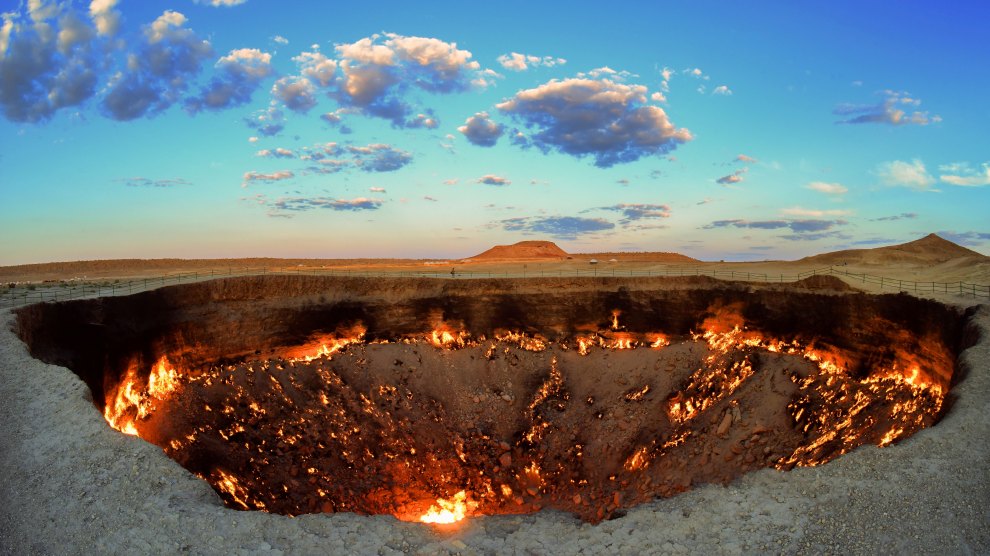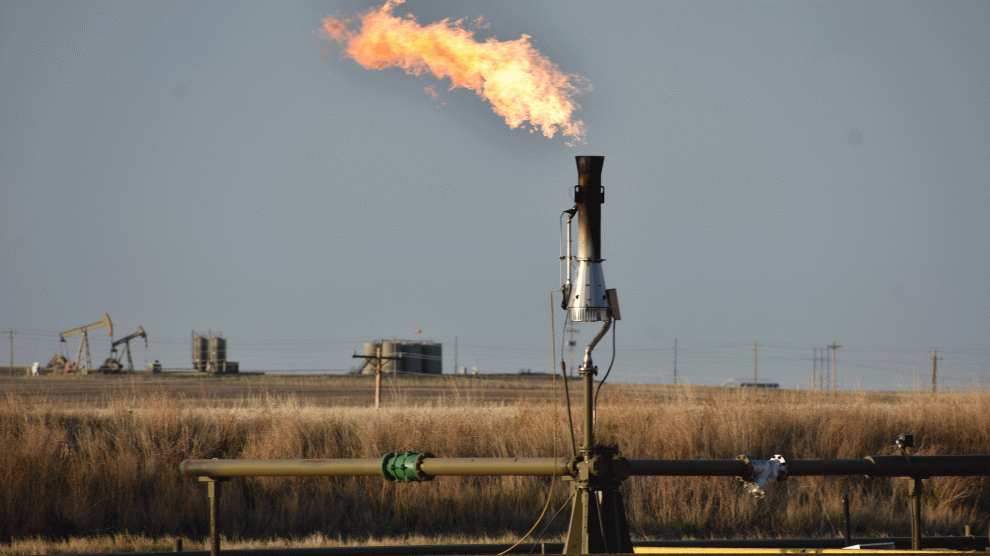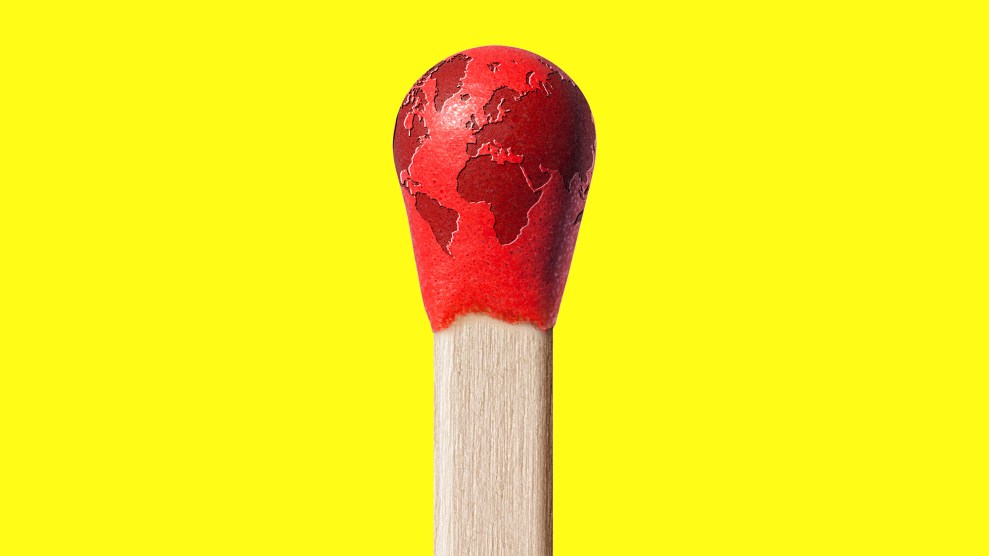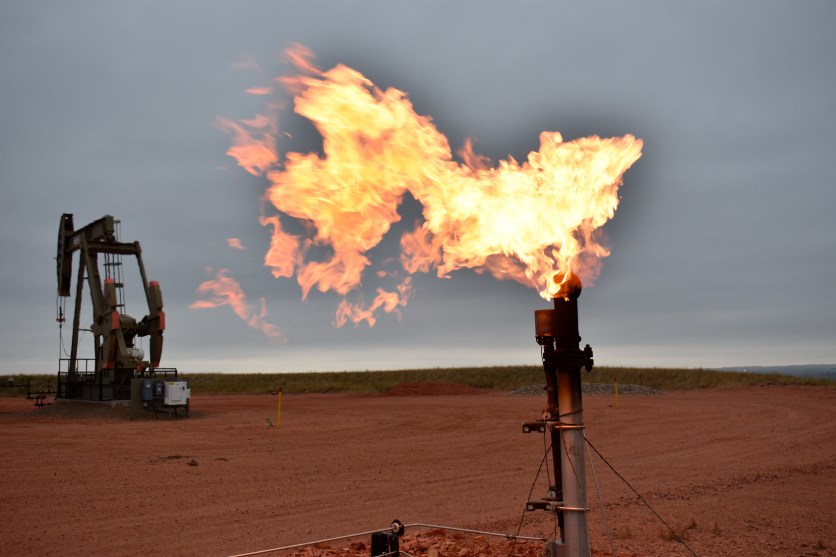
This gas-fueled crater fire near Darvaza, Turkmenistan, is nicknamed the "Gates of Hell."Alexander Vershinin/AP
This story was originally published by the Guardian and is reproduced here as part of the Climate Desk collaboration.
The US is in negotiations with Turkmenistan over an agreement to plug the central Asian nation’s colossal methane leaks.
Turkmenistan was responsible for 184 “super-emitter” events in which the powerful greenhouse gas was released in 2022, the highest number in the world. One caused climate pollution equivalent to the rate of emissions from 67 million cars.
US officials hope that some leaks from Turkmenistan’s oil and gas industry could be halted by the start of the UN’s Cop28 climate summit in late November. Success would represent a major achievement in tackling the climate crisis.
Methane emissions cause 25 percent of global heating today. A surge since 2007 may be the biggest threat to keeping below 1.5C of global heating above pre-industrial levels and seriously risks triggering catastrophic climate tipping points, according to scientists. Tackling leaks from fossil fuel sites is the fastest, simplest and cheapest way to slash methane emissions.
John Kerry, the US special envoy for climate, spoke with the president of Turkmenistan, Serdar Berdimuhamedov, on Monday. In April, US secretary of state Antony Blinken met foreign minister Rashid Meredov in Washington DC, with Blinken “underscoring the critical importance of reducing methane emissions to combat the climate crisis and outlining opportunities to work with Turkmenistan.”
“The US and Turkmenistan…will endeavour to feature methane mitigation outcomes by Cop28,” a US statement said. An agreement could see the US providing financial support and expertise, according to Bloomberg News.
After the Kerry-Berdimuhamedov call, Turkmenistan’s foreign ministry recorded an “exchange of views” and said “systematic work is being carried out in our country…focused on the consistent introduction of advanced environmentally friendly resource-saving technologies in the oil and gas, energy, transport and other industries.” Satellite data shows little change in Turkmenistan’s methane emissions from 2019-2022.
New satellite data is increasingly putting the spotlight on nations with major methane leaks. These include the US, where new regulations will impose large fines for leaks, and Russia.
In early May, the Guardian revealed that methane leaks alone from Turkmenistan’s two main fossil fuel fields caused more global heating in 2022 than the entire carbon emissions of the UK. Emissions of the gas were “mind-boggling” and an “infuriating” problem that should be easy to fix, experts said.
In March, the Guardian revealed that Turkmenistan was the worst country in the world for methane “super emitting” leaks, based on satellite data analysis by French company Kayrros. The leaks are believed to come from ageing and poorly maintained oil and gas pipelines and from the venting to the atmosphere of unwanted methane gas that is produced alongside oil, though gathering information on the ground in the repressive and authoritarian state is very difficult.
A recent scientific study found significant leaks from just 29 pieces of equipment in one of Turkmenistan’s main fossil fuel fields. It also suggested a switch from the flaring of methane, when unwanted gas is burned, to venting was behind some of the vast outpourings. Burning the gas produces carbon dioxide, which causes about 80 times less global heating over 20 years. Relighting flares is straightforward and fixing leaks increases the amount of gas captured, increasing revenues.
“Pumping gas out of the ground and immediately releasing it into the air is about as clever as driving a car over a cliff,” said Prof. Euan Nisbet of Royal Holloway, University of London, a member of the scientific oversight committee of the UN International Methane Emissions Observatory (LMEO). “Kerry will deserve much credit if the US can help Turkmenistan rapidly cut its methane emissions.”
Manfredi Caltagirone, head of LMEO, told the Guardian: “Reducing methane emissions is key to reaching the objective of the Paris Agreement. Turkmenistan is an important country of focus for global actions on methane emissions, but so are other major emitting countries such as Russia, US, Iran, Iraq, China, Libya, Algeria, Venezuela and Canada.”
LMEO, hosted by the UN Environment Programme, is creating a global dataset of verified methane emissions that will be reported to countries to enable them to take targeted action and then made public.












